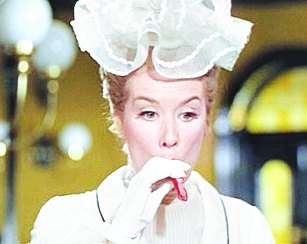
In one of the scenes in the film, Chitty Chitty Bang Bang, Truly Scrumptious walks into Caractacus Potts's quaint little workshop and chances upon a sweet-making machine. "Is this one of the sweets?" she asks, curiously examining the long, cylindrical confection. "Is it supposed to have holes in it? The boiling point of your sugar is too high." "An expert on sweet-making, are we?" sneers Potts, unaware that Truly is the daughter of the candy factory owner, and has inadvertently directed him towards the selling-point of his creation. Potts soon realizes that he has invented "whistling sweets"; he goes to Lord Scrumptious's sweet factory where, in a long musical sequence that provides a rather inaccurate representation of Edwardian-era factory conditions in England, the edible whistles are renamed "toot sweets".
If there was anything that fascinated me more than the flying car in the 1968 film, it was the toot sweet. It was not hard to see why I wanted one so badly: I was a nine-year-old with a sweet tooth who could not whistle. However, as a recent newspaper report suggests, few people share this desire or covet a talent for whistling anymore. Whistling, it seems, is no longer as popular a musical and cultural pursuit as it used to be - listening to music on the iPod has become more attractive than whistling while one works. Paul McCartney had once said he knew that the Fab Four had truly succeeded only when he heard the milkman whistling one of their tunes. You might be oblivious of this fact as you opt to listen to the Beatles on your iPod instead of whistling Hold Me Tight or Hey Jude yourself.
The irony is telling, especially in the light of the inextricable links between the physical act of whistling and the making of music. Like whistling, the mastery of several musical instruments involves respiratory strength, control and a use of the mouth and lips. While playing the trombone, the musician's lips on the embouchure hole channel the vocal breath into an air stream by shaping the lips into a slight pucker, as if to say "ooh". Other wind instruments, such as the native American flute, the Japanese shakuhachi and the bansuri, are difficult to master, but also require the deft manipulation of breath and air to produce music. And yet, the discernible lack of ordinary whistlers today makes one wonder what it might mean for the learning of wind instruments. Might it be affected by this reluctance to make music with the mouth?
Whistling has long been considered jaunty behaviour, a sign of cockiness; men who whistle are often said to possess devil-may-care attitudes. While it is certainly objectionable in the context of men whistling at women with an intent to harass them, would it be fair to extend such censure to the act of whistling music - an act so closely linked in nature to love and courtship? (Or think of the sinisterness of the low whistling at night in Holmes's "The Speckled Band".)
It has been suggested that the dwindling numbers of postmen, milkmen and newspaper delivery boys (jobs traditionally associated with whistling), as well as the growing popularity of the cell phone and iPod, may be to blame for the demise of whistling. But there still exist "whistled languages" like the one found in Oaxaca in Mexico, or Spain's Silbo Gomero, which are developed, nuanced and practised by large communities. The Silbo Gomero involves whistling in Spanish. It replaces consonants and vowels with whistling; the tone of the whistle and its continuity or interruption are what distinguishes each syllable from the other. It is taught in schools and can even help to identify a whistler's origin according to the language's local variant. That is why most of the people, especially the youth, in La Gomera in the Canary Islands use it. Instances of such language systems endure even in Europe, where one would expect the rapid pace of linguistic evolution to have long rendered whistled languages extinct.
In Sittingbourne in England, Dale Howting is known as the "whistling postman". A woman had once complained to the post office that Howting's early-morning whistling disturbed her. The postmaster had to ask Howting to stop. However, his other customers noticed the absence of his whistling, and demanded that he begin again. Perhaps Catherine Bott, who explored the art of whistling in the BBC Radio 4 programme, The Whistling Woman, is not too far off the mark when she says that whistling has "got more of a future" than she imagined. It is, above all, a lot of fun; as Lauren Bacall had put it, all you have to do is "put your lips together and blow". Now in his 80s, Howting is not a postman anymore, but he still whistles.










